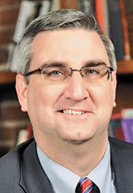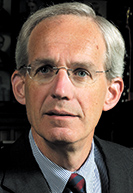Subscriber Benefit
As a subscriber you can listen to articles at work, in the car, or while you work out. Subscribe Now
In the legal brawl between Gov. Eric Holcomb and the Indiana General Assembly over who has the power to call the Statehouse into a special session, the Marion Superior Court will first have to determine which lawyers are actually representing the executive branch.
Holcomb filed a lawsuit April 27 against the Legislature’s Republican leaders and the Legislative Council after the General Assembly overrode his veto of House Enrolled Act 1123. The governor is challenging the constitutionality of certain provisions in the law that allow the Legislature to call itself back into session whenever a state of emergency has been declared.
“I took an oath to uphold the Constitution of the State of Indiana and I have an obligation (to) do so,” Holcomb said when he filed the lawsuit. “This filing is about the future of the executive branch and all the Governors who will serve long after I’m gone.”
Senate President Pro Tem Rodric Bray, R-Martinsville, said he was not surprised by Holcomb’s action.
“The governor shared his intent to challenge the constitutionality of this law with me and this is not unexpected,” Bray said. “As I have said before, there is a fundamental disagreement on the constitutionality of HEA 1123.”
However, Indiana Attorney General Todd Rokita immediately inserted himself into the dispute. He asserted his office has “exclusive authority” to resolve disagreements over legal questions between two units of state government.
Three days after the governor sued, Rokita filed a motion to strike, arguing in part, “the Governor cannot merely sue the legislature over laws he does not like.” In addition, a team of lawyers from the attorney general’s office filed an appearance in Marion Superior Court on behalf of all the parties, including Holcomb.
The governor had retained Lewis Wagner attorneys John Trimble, A. Richard Blaiklock, Aaron Grant and Michael Heavilon to represent him in Holcomb v. Bray, et al., 49D12-2104-PL-014068. He urged the court to promptly resolve the “significant uncertainty and confusion” created by the law.
“Any delay in addressing the constitutionality of the Disputed Provisions in HEA 1123,” Holcomb’s suit argues, “could result in severe disruption to Indiana and the proper functioning of state government.”
Attorney general’s role
In his motion, Rokita claims the executive branch lacks the authority to bring the lawsuit because it has not received permission from the attorney general’s office to hire outside counsel. He cited State ex rel. Sendak v. Marion Cnty. Superior Court, Room No. 2, 373, N.E.2d 145, 148 (Ind. 1978), to bolster his argument that no state agency can hire an attorney without written consent from the attorney general.

But retired Indiana Supreme Court Justice Frank Sullivan said Rokita is misreading court precedent and intruding on the authority of the judiciary.
The decision in Sendak, Sullivan said, is “totally irrelevant as a precedent in this circumstance.” In that case, the Supreme Court did find the governor needed the consent of the attorney general before hiring private counsel to represent a state agency. But the dispute was between a business, A-1 Beverage Co., and the Indiana Alcoholic Beverage Commission.
In an email sent to Indiana Lawyer, the attorney general’s office maintained the courts have nothing to decide in this situation because there is no concrete dispute and no adverse party.
“Two state entities disagree on a legal question,” the email stated. “It is the responsibility of the Office of the Attorney General — not the courts — to resolve such intra-State disputes and adopt a single, uniform legal position on behalf of the State as a whole.”
Sullivan countered the executive and legislative branches are clearly adverse in this “real and dramatic and genuine” dispute. “Rokita calls the Governor and Legislature ‘state entities’ as though this was a dispute between the BMV and INDOT,” Sullivan wrote in an email. “The Governor and the Legislature are not ‘state entities,’ they are separate branches of government under the Constitution. The Attorney General is important but he is not a ‘repository of constitutional power.’”
Exclusive function of governor
In his lawsuit, the governor argues that under Article 4 § 9 of the Indiana Constitution, only his office has the power to call the Legislature into special session. Also, he points to Article 3 § 1, which prohibits the Legislature from infringing on any function given exclusively to another branch of government.
“The right and authority to call a special session is clearly, unequivocally, and exclusively a function of the governor,” Holcomb argues in the complaint. “As such, neither the General Assembly nor the Legislative Council can exercise this function since the Indiana Constitution does not expressly allow for it.”
HEA 1123 was carried on Republican votes and came with warnings from constitutional law experts that the bill was unconstitutional. During the hearings and debates, lawmakers in support of the measure acknowledged the law would create uncertainty and confusion but said they would let the courts decide.
House Democratic Leader Phil GiaQuinta of Fort Wayne described the bill as symptomatic of “Republican infighting” using taxpayers’ dollars in “needless power struggles.”
“House Democrats voted ‘no’ on this bill because we believe in prioritizing Hoosiers’ safety over political attacks,” GiaQuinta said in a statement. “When there are too many cooks in the kitchen, decisions take longer to make, and when we’re talking about public health emergencies we don’t have time to waste. The governor is more than capable of holding this responsibility and I am disappointed we have come to this yet again.”
Sullivan and Indianapolis public-interest attorney William Groth said they believe Rokita’s denial of the governor’s request to hire outside counsel potentially puts the attorney general in violation of Indiana Professional Conduct Rule 1.7 barring conflicts of interest.
With the dispute over HEA 1123, Groth said the governor and the Legislature have “diametrically competing interests,” so Rokita “had an obligation” to allow Holcomb to hire private counsel. Instead, he has put himself in a predicament.
“The Rules of Professional Conduct apply to him as well as all lawyers,” said Groth, of counsel at Vlink Law Firm LLC. “He hasn’t been given a blanket exemption from the rules by virtue of his office.”
In a statement, the AG’s office rejected allegations of a conflict of interest, noting, “the Rules of Professional Conduct and attendant commentary take account of the special responsibilities of government attorneys and authorize attorneys general to act in the public interest even when doing so is contrary to the wishes of particular agency clients.” As an example, the office referred to Rule 1.13, comment 9 and Scope [18].
“… In declining to authorize outside counsel to represent the Governor here, the Office of the Attorney General is not beset by a conflict of interest but is instead fulfilling its core purpose — setting a single, unified legal position for the State as a whole,” the statement said.
The Marion Superior Court has given the governor 15 days from April 30 to respond to the attorney general’s motion to strike.•
Please enable JavaScript to view this content.
